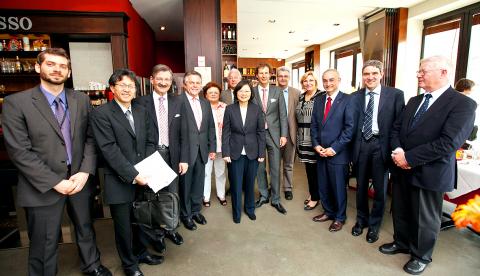Senior German policymakers have reportedly expressed support for Democratic Progressive Party (DPP) Chairperson Tsai Ing-wen’s (蔡英文) initiative to phase out nuclear power by 2025 in Taiwan in favor of more sustainable energy.
A statement given by the DPP, which could not be independently verified, said that German lawmaker Hans-Josef Fell, a key author of a renewable energy law, met with Tsai on Tuesday in Berlin to discuss her “2025 nuclear-free homeland” plan.
“The two sides exchanged opinions on Germany’s energy and nuclear-free policies. Fell expressed high recognition of Tsai’s [proposal] and believes that the whole world will look toward Taiwan if it were to progress toward this target,” the DPP statement read.

Photo: Ccourtesy of the DPP
“Fell said the anti-nuclear movement has become the trend after the Fukushima Dai-ichi nuclear power plant incident,” the statement said.
The DPP said the German experience represented a “big encouragement” that would be considered for future policy in Taiwan.
“The German government has showed leadership abilities over the past decade to support sustainable energy through its policies. As a result, renewable energy sources today account for 17 percent of its power needs, among the world’s highest,” the DPP said.
The DPP’s presidential candidate was said to have noted that Germany’s sustainable energy policies have since created more than 370,000 jobs, suggesting that a similar feed-in tariff scheme could do the same to Taiwan.
The “2025 nuclear-free homeland” is Tsai’s first major policy initiative since announcing she would run for president.
It aims to prevent commerial operations after the completion of the Fourth Nuclear Power Plant and to not renew the licenses for the three plants now in operation, pending the development of other renewable sources.
Government officials have said the plan represents a flip-flop for Tsai, because she had once supported the Fourth Nuclear Power Plant.
DPP officials accompanying Tsai on her trip to Germany and the UK also said that she met with German lawmakers belonging to a “Taiwan caucus” as well as the German Council on Foreign Relations, a prominent think tank staffed with retired policymakers.
Tsai was said to have told the politicians that cross-strait issues concerned not just Taiwan and that Taiwan should stand side-by-side with the international community when it came to dealing with Beijing.
“Taiwan should base the framework for cross-strait interactions on its relations with the rest of the world. This method will avoid falling into a political trap that will see [Taiwan] trade political concessions for economic benefits,” a DPP transcript of the meeting quotes Tsai as saying.
On Tuesday evening, Tsai told a gathering of Taiwanese expatriates that she believed the DPP and the Chinese Nationalist Party (KMT) were locked in a very close race for next year’s presidential and legislative elections.
Both parties have grassroots support of 6 million voters and backing from 1 million to 1.5 million undecided voters, who will be key to victory next year, she said in comments recorded by local media.

Several Chinese Nationalist Party (KMT) officials including Chairman Eric Chu (朱立倫) are to be summoned for questioning and then transferred to prosecutors for holding an illegal assembly in Taipei last night, the Taipei Police said today. Chu and two others hosted an illegal assembly and are to be requested to explain their actions, the Taipei City Police Department's Zhongzheng (中正) First Precinct said, referring to a protest held after Huang Lu Chin-ju (黃呂錦茹), KMT Taipei's chapter director, and several other KMT staffers were questioned for alleged signature forgery in recall petitions against Democratic Progressive Party (DPP) legislators. Taipei prosecutors had filed

Taiwan would welcome the return of Honduras as a diplomatic ally if its next president decides to make such a move, Minister of Foreign Affairs Lin Chia-lung (林佳龍) said yesterday. “Of course, we would welcome Honduras if they want to restore diplomatic ties with Taiwan after their elections,” Lin said at a meeting of the legislature’s Foreign Affairs and National Defense Committee, when asked to comment on statements made by two of the three Honduran presidential candidates during the presidential campaign in the Central American country. Taiwan is paying close attention to the region as a whole in the wake of a

NEW WORLD: Taiwan is pursuing innovative approaches to international relations through economics, trade and values-based diplomacy, the foreign minister said Taiwan would implement a “three-chain strategy” that promotes democratic values in response to US tariffs, Minister of Foreign Affairs Lin Chia-lung (林佳龍) said. Taiwan would aim to create a “global democratic value chain,” seek to capitalize on its position within the first island chain and promote a “non-red supply chain,” Lin was quoted as saying in the ministry’s written report to the Legislative Yuan submitted ahead of the legislature’s Foreign Affairs and National Defense Committee meeting slated for today. The Ministry would also uphold a spirit of mutual beneficial collaboration, maintaining close communication and consultations with Washington to show that Taiwan-US cooperation

Taiwan and the US have begun trade negotiations over tariffs imposed by US President Donald Trump earlier this month, Minister of Foreign Affairs Lin Chia-lung (林佳龍) said in an interview this morning before reporting to the Legislative Yuan’s Foreign Affairs and National Defense Committee. The Taipei Economic and Cultural Representative Office (TECRO), Taiwan’s de facto embassy in the US, has already established communication channels with the US Department of State and the US Trade Representative (USTR), and is engaging in intensive consultations, he said. Points of negotiation include tariffs, non-tariff trade barriers and issues related to investment, procurement and export controls, he